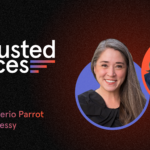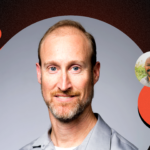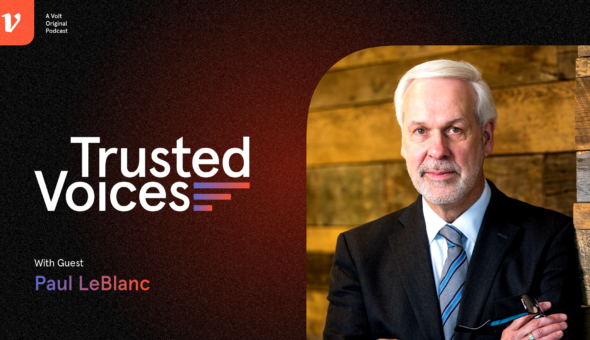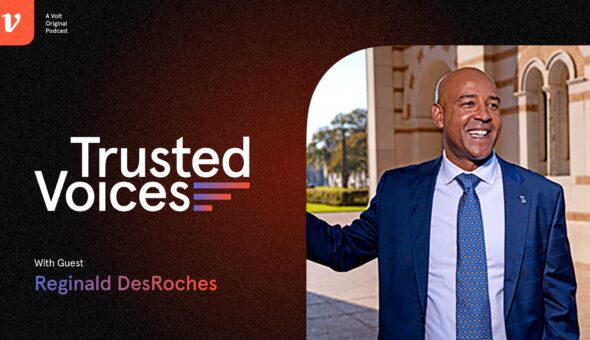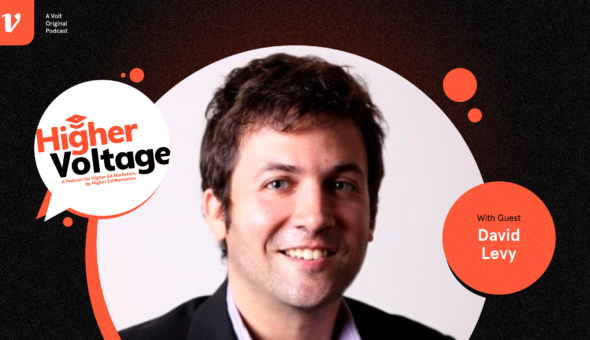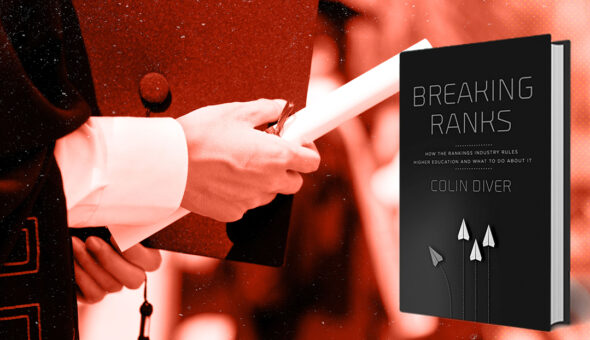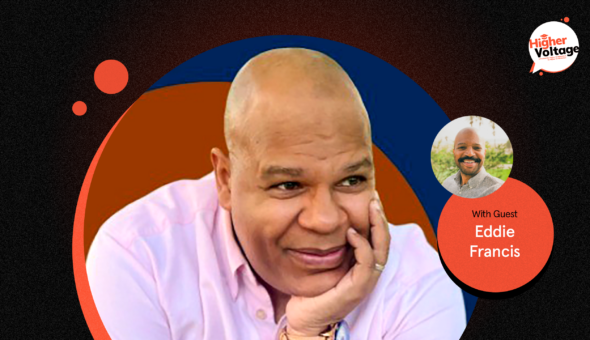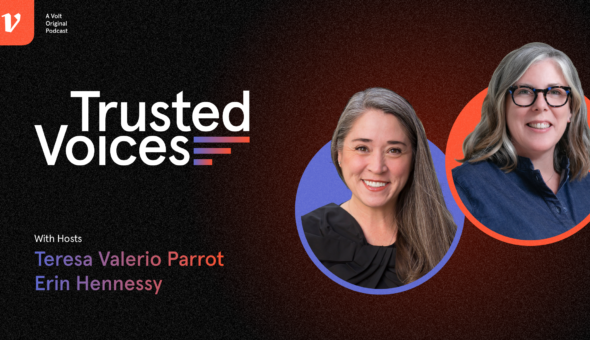The first episode of the new Trusted Voices Podcast launches with guest Vincent Rougeau, president of the College of the Holy Cross, in Worcester, Mass., joining hosts Teresa Valerio Parrot and Erin Hennessy to discuss what its like to lead through a transition. Rougeau assumed his current position in 2021 after a decade as the dean of the Boston College Law School. In this conversation he discusses his experience assuming the leadership role at his current institution, what that transition period was like, and his experience as the first Black president of College of the Holy Cross (among other firsts).
Before he joins the conversation, Teresa and Erin talk about some recent news in higher ed, including the racist remarks made by Chancellor Thomas Keon at Purdue University Northwest’s graduation ceremony and the appointment of former Massachusetts governor Charlie Baker to be the new president of the NCAA.
Stay tuned for part two of this first episode, coming early next week, when the hosts reflect on the conversation they had with Rougeau and the key takeaways from that conversation that higher ed leaders can apply to their work.
Show notes:
- NCAA Announces Massachusetts Gov. Charlie Baker as Next President
- Profit Motives Make Fixing College Sports Nearly Impossible
- UCLA Is Allowed by California Regents to Join Big Ten
- College Leaders Make Mistakes. Here’s Why They Should Apologize for Them.
- What Is so hard about “I’m sorry. We were wrong. We can do better.”?
- SorryWatch
- Vince Rougeau, president, The College of the Holy Cross
Read the full transcript
Teresa Valerio Parrot:
Hello, and welcome to the first episode of the Trusted Voices podcast. I’m Teresa Valerio Parrot alongside Erin Hennessy, and in each episode, we’ll discuss the latest news and biggest issues facing higher education leaders through a communications lens. For these conversations, we’ll be joined by a guest who will share their own experiences and perspective.
Erin Hennessy:
This week, we’re talking with a fantastic college president about his role and the pressing issues our industry is facing, but first, let’s talk about some of the stories that caught our eyes this week. Teresa, I’m guessing you want to talk about some announcements of interest to you?
Teresa Valerio Parrot:
Absolutely. For our audience’s background, and I’m sure you’re going to hear about this quite a bit, I’m spending the holidays and through next spring writing my dissertation, which is focused on presidential and board governance of intercollegiate athletics, and for that reason, I was very interested in the appointment of former Massachusetts Governor, Charlie Baker, to be the new President of the NCAA. I think it’s a fascinating hire. For this reason, we have traditionally had former university presidents with those who are so close to the academy, serve as president of the NCAA, and this is one of the most political and sensitive topics that you have on a campus, and to have somebody who has the savvy to navigate the court of public opinion, as well as the court of law, I think it’s actually a really smart hire. I’ll be curious to see how the actual implementation goes, but I think looking at someone who can see us from many sides and isn’t an insider is a really interesting choice at this point. Erin, I’m curious what you think.
Erin Hennessy:
Yeah, I certainly am not as steeped in big-time college athletics as you are, Teresa. It’s actually something I selected against when I made my own choices for college, but I think as an industry, higher education has been waiting for years and years and years for Congress to really get involved in the NCAA, and I think the implementation of name, image, and likeness regulations for our student athletes is the point where that’s probably finally going to happen, and I think you’re absolutely right, choosing someone who is politically savvy on a number of different levels is, I think a signal that the NCAA board feels that the time is ripe as well for athletics to be a focus of significant congressional action moving forward.
Teresa Valerio Parrot:
I agree. We will drop into our notes from this episode some things, different things that we encourage people to read, and I’m going to be dropping in something that I wrote about the background of athletics. For those of you who are academics, this was the backbone of my second chapter of my dissertation, the literature review, so if anybody wants to nerd out on the history, I’m happy to have them join. One of the things that is pretty significant in my dissertation and that chapter two in this piece is talking about the conflicting logics that we have with athletics, and that’s, that we talk about athletics about living a mission and purity of sport, but then there is this reality that’s tied to making money. So my second piece that I want to mention is that I also think it was interesting that UCLA is going to be moving to the Big Ten, and I loved this phrase, I saw it on Twitter …
RIP, Twitter, but I see it on Twitter somebody called it the Calimony that was going to have to be paid to Berkeley to exit the Pac-12 and to make sure that there is equity within the UC system, and I think that’s a fantastic example of that disconnect that we have between mission, our student athletes are coming to campus to get a degree, and then the money-making, also the travel associated with going across the country for these games, and how we reconcile that for ourselves.
Erin Hennessy:
Yeah, again, you know I sort of butt up against that, those disparate missions all of the time, and I, being as cynical as I am, see institutions and athletics organizations pick and choose when they decide to cover themselves in mission. It’s usually to excuse or explain away some bad choices, and when they really admit, accept, and embrace the money-making side of the house from a logistics standpoint, flying folks back and forth across the country. I mean, I guess the one upside that COVID provided there is that students are more flexible and more able to access their coursework, but I’m just thinking about all of the missed classroom time that those student athletes from UCLA are going to have to navigate as they fly out here to New Jersey to compete against my Scarlet Knight, and this is where I go, “Oh, wait a minute, is Rutgers still on the Big Ten?” I’m so out of my depth on athletics.
Teresa Valerio Parrot:
And you said my, so you do have a couple of tams that you follow.
Erin Hennessy:
I am.
Teresa Valerio Parrot:
But I think that’s an excellent point, and it’s one of the topics that I get on a soapbox pretty regularly. In March., That seems to be one of the topics I talk about, because you have these March Madness games that end at 2:00 in the morning, and then the student athletes have to get on a plane and fly home to go to class the next day, and that’s a really difficult turn for us to be asking of them, and it does make me wonder how many of the student athletes see themselves as athlete students. So with that, Erin, what was of interest to you?
Erin Hennessy:
Thank you for mentioning the soapbox because I’m going to get up on mine. One of my regular soapboxes and one of the conversations that you and I have all the time is talking about how higher education leaders come up short so often when they are in a position where they need to accept responsibility and apologize. There’s a clip I could point to you from a recent leader who has stepped in it, but I imagine by the time this airs, there will be another clip and another leader who has stepped in it, and what continues to perplex me, and I know it does you as well, is when institutional leadership makes a misstep, makes a mistake, when the apology takes too long, when it doesn’t credibly address the actual offense, or when it points at a long list of so-called accomplishments as an excuse for behavior, folks watching know that that apology is way off the mark and it tends to actually extend that story, which is the last thing an institution wants. One of the places that I go all of the time to keep a pulse on how public apologies are being received and how they’re coming up short is this great Twitter account, RIP Twitter, called SorryWatch. They actually have a website, SorryWatch.com, and they are putting out a book that publishes actually on January 10th, I know because I pre-ordered it this weekend.
They compile apologies, good and bad, offer really smart critiques of those apologies, offer a really simple framework of how to do it well, and I think they’re a great resource for higher ed communicators as we all look across coverage and see where folks are coming short. Teresa, you and I talk about this all the time, what’s your favorite theory on why folks struggle so much with something that we teach our kids so early on?
Teresa Valerio Parrot:
I think that’s part of it, is that people worry that if they apologize, especially in leadership positions, that they are showing vulnerability, and that vulnerability will become a death spiral for their leadership. Erin, I always appreciate when we have the conversations about apologies because as you and I know, there are few and far between, and we have very few examples of great apologies. We keep track of those, actually. The other thing that we keep track of is watching presidents who give sincere apologies versus those that give these CYA sort of statements and language that you were talking about. What we have found is there seems to be this feeling among presidents, and especially their legal counsel and communicators, as we talk with them, that if you give a genuine apology, that you make yourself more vulnerable, and what we have found is that vulnerability helps you keep your job.
Most often, when we see a death spiral from a tenure is from someone who gives one of these half-hearted statements or something that feels forced or something that feels very legal, and we would encourage sticking with that potentially more vulnerable in-the-moment statement, that ends up being a stronger leadership position, and specifically to the situation that you were referencing, I think what was so off-putting to me is that the statement that was put out felt like it was mansplaining intent, and then the follow-up that came out after that was mansplaining context. If you have to explain, that’s a problem, but if you are mansplaining, to me, that seems like it’s a double dip of vulnerability that is not what’s intended in that moment.
Erin Hennessy:
I agree. I think there’s a larger societal issue we need to talk about as well, where it seems like the only larger societal response to a mistake or a misstep lately is calling for someone’s job, but I’m not surprised this morning to see that there was coverage of, again, this institution we’re talking about, where a number of faculty groups have come out and called for the resignation of the person who made this misstep that was covered last week, so that vulnerability can often save a job, but it’s not … I don’t think I guarantee anymore because so much of the societal response on Twitter, RIP, Twitter, is tied to wanting to have somebody get punished and deal with a very real set of consequences that oftentimes aren’t necessarily in line with the original offense, but that’s a bigger question. I have a feeling we’re going to come back to this topic over and over again through the course of these conversations, but for now, I think it’s time to shift our conversation to chatting with this week’s guest. Teresa, do you want to introduce him?
Teresa Valerio Parrot:
Absolutely. It is my honor to introduce our first ever podcast guest, and I want to note that higher education leadership requires successfully navigating complex and differing situations like the ones that we’ve been talking about this morning, and all of these exist at the intersection of leadership and communications, which is why we wanted to launch this podcast. We wanted to hear from those that we trust as they contemplate and maneuver these complexities. So when Erin and I talked about who we trust, I named a newish President, who doesn’t shy away from talking about tough issues the industry is facing and does so with intelligence, integrity, empathy, and based on our last conversation, I would also say with grace. Vincent D. Rougeau, a nationally respected expert in legal education and Catholic social thought, became the 33rd president of Holy Cross in July 2021.
He previously served as Dean of the Boston College Law School and the Inaugural Director of the new Boston College Forum on Racial Justice in America, a meeting place for listening, dialogue, and greater understanding about race and racism in America. Prior to his role at Boston College, Rougeau was a tenured professor of law at Notre Dame Law School and served as their Associate Dean for Academic Affairs from 1999 to 2002. In the interest of transparency, I need to share that College of the Holy Cross is a TVP Communications client. We won’t often bring clients on the podcast, but we think President Rougeau has such an interesting perspective to share that we wanted to have him as our first guest. Vince, welcome to Trusted Voices.
Vincent D. Rougeau:
Thank you. It’s a pleasure to be here.
Teresa Valerio Parrot:
Thank you. As you’ve talked about, there’s a number of elements of your background that give you a really interesting and unique perspective to be a college President, as that former Dean of a law school, and you’re the first lay and Black President of a Jesuit Liberal Arts campus, your scholarship is at the intersection of law, race, and religion, and you just talked to us about tying real estate and ethics together. All of those are really, really interesting. Can you tell us how your background prepared you for this presidency at this time?
Vincent D. Rougeau:
Sure. Well, first, let’s start with just my academic work in terms of thinking about what the mission of this institution is. Yeah, it does seem kind of odd to think about Catholic social teaching and real estate, or banking, but a lot of these questions, particularly in the context of American law and race, as you mentioned, really deal with how a culture, how a country evolves in terms of how people are treated, what issues sort of drive the country forward, in particular, points of crisis. Obviously, this country had major issues as it evolved from a slave-holding society to one where people were not considered property, strong racial issues, and serious racial problems that were part of that as well, but a lot of it also was about how people become sort of autonomous in their ability to acquire wealth, to acquire a certain kind of stability in the society to really be a citizen who has rights and can function as a person sort of fully recognized in his or her humanity, so those issues, I think, all kind of collide around what we can own, what we can’t own, what kinds of jobs we can have or cannot have, so those things really animated me. Then, of course, in the context of being at a Catholic institution, a Jesuit institution, I was really able to think about that from an ethical, moral, and religious standpoint, which not everyone who attacks these questions does, but in these environments, I had that opportunity to really dive into those topics from those perspectives.
Then, yeah, I mean, coming into this role, I was the first Black Dean at Boston College. I’m the first Black President at Holy Cross and the first lay President, so yes, I’ve been able to accomplish some firsts, but in the context, really, of being very immersed in the ethos, and the missions, and the communities of the institutions that I’ve been a part of, and I think that really gave me the perspective and the context to move to a leadership role at Holy Cross, because I’ve really spent my whole career in institutions that share a lot of the values and the mission that Holy Cross has, I come from a Catholic family, and so that was also a very helpful perspective for me to have, but I also bring, because of who I am as an African-American, a perspective on being Catholic, that’s probably different from what many people assume, and as my role in higher ed, African-Americans and other people of color in higher ed are gradually becoming a bigger presence, particularly in leadership, but that’s taken time and my career has kind of been a part of that change, so I have that perspective to bring as well. I think just by doing what I’ve done, where I’ve done it, has been a great preparation for leadership now at Holy Cross.
Erin Hennessy:
President Rougeau, you’ve talked about your preparation for leadership and your preparation for a presidency, but I would love to ask you to dig a little bit deeper in how you prepared for this presidency, thinking particularly about that time between when you got the great good news that you were headed to Worcester and the time that you actually pulled into the President’s parking spot for the first time and had that first day at work. How did you think about the institutional culture, what the place needed, what you needed to know about the institution, and how did communications wrap into that process between appointment and taking the office?
Vincent D. Rougeau:
Yeah, that’s a wonderful question. I think that’s funny, the very first group on the campus that I had to work very closely with from the moment I was named was the marketing communications team because we had to think carefully about how the news would be rolled out, because there’s a moment there when you’re sort of in two places at the same time, right? I was Dean in the Boston College of Law School, I was about to become President of the College of Holy Cross. There needs to be a lot of coordination as to who got that information early on, how that information would be shared, how the communities that I was a part of would learn of that information, so very, very important role for the communications team to work closely, not only with me, but also with the communications team at my previous institution to make sure that we were respectful and thoughtful about how this messaging came out. So that was one of the first big lessons I learned that was new. Like what did we have to think about institutionally and to institutions about how this piece of news would be delivered, and what did I learn about sort of the quirks of each in terms of who needs to know and how information travels, those kinds of things.
That was the first thing. Then, it became, I think a lot of listening and learning. I mean, people immediately begin to reach out to you in your new role, to get to know you, but also to share with you things that are important to them. I think when you have been appointed to a presidency, you have to be very careful about just taking in the information that’s being delivered to you and not really making a whole lot of judgments about it, because, one, technically you haven’t started, but two, you have to think carefully about, “Well, why is this person coming to me at this time with this piece of information? Is it simply a way of welcome? Is it because they have a particular agenda they want to share?”
“Is there a concern that I’ll need to be very sensitive to when I move into it?” So I think you’re spending a lot of time thinking carefully and listening deeply, and being very honest about the fact that you’re not in a position to make decisions at this stage. That was another strange aspect of the appointment, right? I was still running Boston College Law School, but now, I’ve been announced as President of the Holy Cross, so you feel like you have two jobs, but one job, you really can’t, really execute on yet, and the other job, you still have, but people now are realizing that you weren’t going to be around, so they’re trying to sort of reframe what their responsibilities would be once you’re gone, so it’s a very complicated period, I would say, but at the same time, if you’ve been in a process of being hired, you have a sense of where some of the key issues lie, and what are some of the things that you need to be working on, so this is also a great moment to begin thinking and sort of looking at what’s happening on the campus in a clear way. Now, I’m going to be leading this school. I’m going to watch very closely what’s going on on the campus to see if the things I picked up in the interview process, how they’re being manifested now in reality, given that I will be stepping into this role, so it’s an odd time given the positioning you’re in, but it’s also a really important time, I think, to be very thoughtful and to be mainly quiet, to do a lot less talking and a lot more listening.
Erin Hennessy:
Is there anything, looking back with the benefit of hindsight, any advice you’d give yourself in that sort of interim period where, as you said, you’re juggling two jobs, one that is but soon won’t be, and one that isn’t yet, but soon will be?
Vincent D. Rougeau:
Yeah. I think I would probably say that it’s really important to be present in the job that you’re leaving as much as you possibly can be, and to, I think maybe say no more to the job that you’re going to enter in terms of requests that they’re making of you. I recall one moment, a couple of moments where I was asked to do some things for the media or others, which were totally appropriate, but I felt really off-balance because I just didn’t know the school well enough to … Although they were presented as, “Hey, this is just an opportunity for this people to get to know you,” which was true, but inevitably, questions would come that I really couldn’t answer fully or that I wasn’t in a position to feel confident that I could frame an answer in a way that was going to be satisfying to me or to the people asking the questions, so I think it’s important for the communications team to think carefully about how to roll out a new leader and to not … I’m not saying that this happened, but I’m just saying that to recognize that it’s going to be awkward.
People are going to use this moment to try to suss out what’s going to happen next even though the person in the role may not know, but they’re going to look for any clues that they can find, and at the same time, I wanted the people, the school I was departing from, which I love dearly and I still have very close relationships with folks there, to recognize that this was a sad moment for me too, to leave. It was just a new step in my own career, but I care deeply for them, and I wanted to make sure that their transition there went as smoothly as possible. That was, really still my primary responsibility, and so I think you have to remember the place that you’re leaving, if you’re still in a position of leadership there, is still your primary responsibility and you have to be on top of that.
Teresa Valerio Parrot:
President Rougeau, you and I have talked a bit about this next topic, and part of why I continue to raise it with you is because I always appreciate how you weave together leadership, law, and communications, and for this topic specifically, it seems to exist at the intersection of the three of those. We’re having more and more conversations with presidents across the country about the role in utility of legacy admissions on their campuses in light of the national conversation about affirmative action. What are your thoughts on legacy admissions in general, and how are you thinking about legacy admissions, specifically as the President of a highly selective private institution?
Vincent D. Rougeau:
Yeah, it’s a very important topic and one where the landscape is changing very rapidly. I think we should start with recognizing that legacy admissions have always been a part of higher education in this country, and they’re not per se wrong. There’s nothing …
Teresa Valerio Parrot:
Right.
Vincent D. Rougeau:
Legacy admissions can be a really important way to build community on a campus and history and a sense of rootedness and groundedness at its best. It also can be a way of, a signal to the institution that they’re doing something right, or they’re … Generation after generation, people want to attend this institution because they believe it gave them something that they want to pass on to people they love and care about, so I think that’s a good thing as well. I also think it’s really interesting to think about where we are culturally right now when we think about legacy admissions. It has not been that long at many institutions that the admissions pool has been open beyond some narrow groups, be it all men or all people from certain ethnic and racial backgrounds, to now, much more diverse.
So in the last 30, 40 years, as college admissions have diversified, more women, more people of color, more diversity on many elite campuses, the legacy admissions we’re seeing today are sometimes producing a very different community than the legacy admissions of 25, 30 years ago, and actually producing something that many of us would see as a good thing, a much more diverse group of legacy admittees on many campuses, which are helping to create a campus environment and a sense of ownership and investment in the campus that looks very different from what we often associated legacy admissions with in the past. Those are all things that I think we should be thinking about as we talk about legacy admissions. Now, that being said, we also are aware right now that we’re facing, in particular, a time where access to higher education for people of modest means, of people who have very little means, even middle class people, is really, really difficult. Typically, these are not people who have benefited in any way from the potential of being a legacy admit. If too much space in the application in the admitted class is given over to legacies, how do we make space for these people who are just trying to get their foot on the rung of the ladder and want to have an opportunity to benefit from what all these legacy admits have benefited from?
That may mean that we have to rethink the whole way we understand the benefits of legacies, so if we need to create space for people who just want their first opportunity, and theoretically, people who are coming from families that have previous generations of college graduates, are much better positioned to find a place in higher education in this country, even if it’s not the place where their parents or grandparents attended, so I do think that has to be thought through very carefully, and obviously, we’re starting to see schools that recognize that for whatever reason. In their case, legacy admissions are no longer appropriate, but I don’t want to say that we should get rid of it whole scale. I think we need to think carefully and look at each institution to see, “How do legacies work in your situation on your campus, and what goals are they forwarding? What things are they inhibiting?” I mean, it’s unfortunate, I think to look at it as a sort of blanket thing.
Well, we should just get rid of it all together without thinking a little bit more carefully about what it provides at certain institutions and why, why it’s important, but again, recognizing the damage that it can do.
Erin Hennessy:
Thank you. I think such a nuanced take on legacy is so important, and I think for the general public, that nuance is missing from a lot of the conversation, and for the general public, I think legacy really feeds this continued distrust of higher education that we all spend so much time thinking and talking about, and it gets to feel like higher ed is really sort of the punching bag for a lot of different segments and sectors of our society, including folks who know higher ed well and work within it and benefited from it. I’m just wondering how you are thinking about this moment in time for our industry when higher education is no longer seen as an absolute good, as a public good, but instead, is sort of representative of a lot of what people think is contributing to divisiveness in our country and in our society. It’s sort of the evergreen problem, and I’m just wondering as a first time college president, how you’re thinking about it as you go about your job.
Vincent D. Rougeau:
Yeah, I think about it a lot because it’s disturbing to me to see something that this country has done so well to suddenly be seen by the citizens of the country as so problematic, in many cases. People have looked to the United States from around the world as a place where higher education is outstanding, and it provides real opportunity for personal, intellectual, professional, and cultural growth, and when you have someone, when you’ve developed a system that has that kind of respect around the globe. You don’t want to kill the goose that laid the local golden egg. I mean, we’re doing something right. Now, we certainly do have an issue around access to this wonderful opportunity, and we have issues internally about whether or not we are doing all we can do to make sure that the education we provide is doing the work it should do in terms of moving young people into the economy, into citizenship, into being productive members of the society, and that’s the other issue that I think a lot about.
I worry that some people want to look at higher education in this very instrumentalist way. If you do this or you can get that, you go to college so you can get a job that should be waiting for you as soon as you leave, and they’re not thinking at all about these other issues, the intellectual development, the cultural issues, the citizenship development. How do we preserve a strong democracy where we are educating young people to be critical thinkers and to understand nuance, for instance, in their day-to-day lives and in the world around them? How do we teach them to appreciate difference in a very dynamic world, in a culture that’s becoming much more multicultural, in a world where we have much more contact with people who are different from ourselves? So those are all things that higher education has been very good at preparing young people for, but one of the things that’s also done, and one of the things we see in our politics is that those people who’ve gone through that experience come out of it with very different views of the world, politics, the economy from those who don’t. There are all kinds of reasons for that, and many of those reasons have to do with economic inequality, the way we live, where we live geographically.
There are lots of issues to think about there, but we, in higher education, I think do have a responsibility to start thinking more deeply and engaging more broadly with people around, “Well, why is that happening? Where can we do better?” I do think that the kind of negativity towards higher education varies across demographic groups. I’ve said this before, coming from the background I come from in and an African-American family in this country, you don’t hear a lot of negative talk about higher education. You might hear negative talks in the African-American community around access.
How do we get higher education for our children and how do we open more doors, but it’s the source of mobility. Certainly in my family, it was the essential ticket to mobility for us, and the data beared this out across all demographic groups. I mean, access to higher education, having attended college or attended some form of higher education after high school leads to better outcomes professionally and economically for most people, but we do have issues like debt, and we have issues, again, as like access. Those are two big things that we need to deal with. I also think sometimes a lot of the conversation around higher ed is really focused on elite higher education, and elite higher educations affects a relatively small percentage of people who get higher education.
We need to talk about all of it and look at it across the board and really then start thinking carefully about what we can do better, and what we’re already doing well and how to get more people access to that.
Teresa Valerio Parrot:
That’s such an important point, and so I’m going to bring us back to elite education one last time, and this is our final topic in question, and we’ve saved a good one for last, I think. As a former Dean of a highly ranked law school, and now President of a highly ranked liberal arts college, what are your thoughts on law schools that are saying they will no longer participate in U.S. news rankings?
Vincent D. Rougeau:
Well, I can tell you that for the entire time of my deanship at Boston College Law School, and I’m pretty sure I speak for my fellow deans, as you know, I served also as the President of the Association of American Law Schools and was on the executive committee for five, six years, rankings have done us no favors in terms of the issues we were just talking about in terms of issues like access and affordability. They’ve created all of these negative incentives for schools to preference certain things in the interest of preserving their position in this imaginary hierarchy, and certainly in law, have created just so much misallocation of resources, so much distress, really. I think it’s fair to call it distress. I mean, faculty and administrators who desperately want to create new programs and to open up opportunities for students who are afraid of doing so because they don’t want the school’s prestige to drop precipitously for reasons that are hard to really understand because the rankings are controlled by an entity outside of higher education, that is attempting to serve consumers. I mean, I’ll give them that, but I think we come back to this idea of nuance.
I mean, how do you have a nuanced conversation about whether or not a school will be right for a student when the student looks at a list and sees that the school you represent is way down, and they’re thinking, “Well, can’t I do better?,” and when you’re, in fact, that school may be the absolute best place for them. And so I applaud, actually, the most elite law schools in the country for finally saying, “Wait a minute, can we step out of this system and just refuse to participate?,” to, what I hope will happen, to create an opportunity for a new discussion on, “How do we provide the best possible information to students and their families about what is the best college or university or law school for you?” I applaud the transparency that rankings have created in terms of information being provided to families in some areas, but if it’s just done to create a league table or a ranking hierarchy, and to promote this sort of sense of excitement about where people are going to fall into rankings, it’s doing more damage than good. It’s just not creating a system where people can really think carefully about what they need and what they’re going to get in return. So there are more and more ways, I think for people to get information about colleges, universities, law schools, and I hope we can come up with a system that points people to a wide array of information sources and allows them to think beyond simply an ordinal ranking when they’re trying to select a school and to think about things like the alumni, network, or other outcomes-based criteria like how students do in terms of job placement or graduate school or all these things, and then to make the best choice.
Rankings were not something that made my job very easy. It caused a lot of consternation and a lot of confusion, so I’m happy that we’re finally kind of reassessing this system and I hope we continue to do that.
Erin Hennessy:
Thank you, President Rougeau for a fantastic conversation. There’s a lot here to mull over, which is exactly what Teresa and I will be doing for the next couple of days. We’ll be back in your podcast feed shortly to share our takeaways, what resonated with us, and some additional resources, but in the meantime, you can find links to some of the things we discussed today in the show notes. Make sure to follow Trusted Voices wherever you get your podcasts, and until next time, thanks to Teresa Valerio Parrot, DJ Hauschild, Aaron Stern, and the Volt team for a great first episode.
